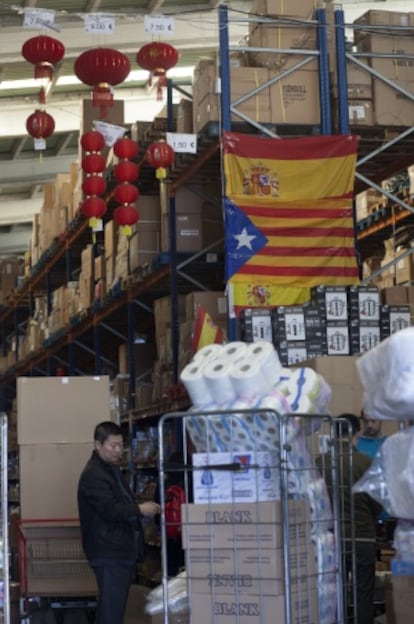How a tax raid changed business practices in Badalona’s Chinatown
Wholesalers in the Catalan city are thought to have defrauded the state of around €64 million “Some have carried on as they did before, but there is more order now,” says one trader


Badalona’s Chinatown is but a shadow of its former self. Five years of economic crisis has left its mark on this vast industrial estate, where warehouses are no longer brimming with cheap goods destined for the hundreds of low-cost Chinese shops throughout Catalonia. Instead, smaller, more modest suppliers, such as one run by Laura, who is second-generation Chinese, are now the norm.
For much of the last 15 years, Chinese businesses in this dormitory town in Barcelona’s eastern suburbs have made huge sums of money importing cheap goods from China: the gleaming automobiles that line the streets of this industrial estate are proof of that. Now, a new generation of Chinese entrepreneurs, like Laura, are adapting to changing times: “Chinese products were very cheap and importers paid virtually no taxes on them. Eventually, they got into problems; that’s why I prefer to pay my taxes, make a little less money, but sleep better at night.”
The “problems” that Laura is referring to date back to October 18, 2011. That day, officials from the Tax and Customs Agency raided around 20 warehouses in Badalona’s Chinatown. They soon discovered that around 70 percent of goods wholesalers sold were undeclared. What’s more, the businesses had not paid tax on their imports from China, which arrive by container at Barcelona’s port, a couple of kilometers down the coast. The officials estimated that the total tax bill owed by the businesses was around €64 million.
Businesses here have made huge sums of money importing cheap goods from China
The tax inspectors had begun their hunt in the neighboring province of Girona, where they noticed that low-cost shops run by some in the Chinese community had very few receipts for the goods they bought from wholesalers. The shopkeepers explained that if they asked their suppliers for receipts, the wholesalers threatened not to supply them. The shopkeepers told the tax inspectors where the wholesalers were based: in Badalona and in Sant Adriá, another district of Barcelona. Around 100 inspectors took part in the operation, which resulted in charges of tax evasion being brought against around 50 people and involved bank accounts being embargoed and properties seized.
The event sent shockwaves throughout the Chinese business community in Badalona, and changed the way the wholesalers operated overnight. A number of cases are still being investigated, while some trials have already taken place, with stiff sentences being handed down. EL PAÍS has been given access to some of the investigations, which reveal the extent to which some businesses went to avoid paying their taxes.
The shopkeepers claimed that if they asked for receipts, wholesalers threatened to stop supplying them
Pan C. ran a company that imported a wide range of goods that were then sold on to low-cost shops. According to public prosecutors, he had a computer program that allowed him to distinguish between the goods he sold: part of his stock was registered, and part of it kept hidden. The scheme was uncovered when officials found a file in his computer called “dailysalestotal” that included sales that were not detailed in his accounts. The idea was simple, but effective: to make his business appear smaller than it was, making Pan C’s tax bill smaller in the process. Over a period of four years he had avoided paying some €1.5 million in taxes, according to public prosecutors.
The Tax Agency’s report highlighted that all the wholesalers it investigated “operated in the same way”. To begin with, they imported their goods from China at a very low cost: some 60 percent below the price that most Spanish companies had to pay for the same goods. The network of importers and wholesalers also had a plant within the customs department at Barcelona port who helped them evade checks and controls. The report shows how, by paying in cash, the importers were able to avoid sales and income tax, as well as import duties.
The importers also had a plant at the port who helped them evade checks and controls
Public prosecutors are demanding tough sentences that they hope will send out a message to importers who try to avoid paying their taxes. They have asked for 16 years in prison for Pan C, for eight separate offenses. For many years, he and other wholesalers were able to make huge profits. For example, according to the Tax Office, for each of the 20,591 dressing gowns that he bought in 2011, he paid €1.56. He later sold them at €7.81, an 80-percent profit. Other goods were even more profitable: t-shirts costing €0.35; socks at €0.12, or pajamas at €1.25; profit margins of almost 90 percent.
Laura sells the same kinds of imported clothing from China in her store, which is decorated with posters of young women in swimsuits. “I used to buy 10 and sell 10. Now I am more selective. The crisis makes it harder to turn a profit,” she explains. Yi, the owner of another store, says he still remembers the impact of the raid by tax inspectors three years ago: “That became very famous. It was in all the Chinese newspapers here. Some people have carried on as they did before, but there is a bit more order now,” he says.







































